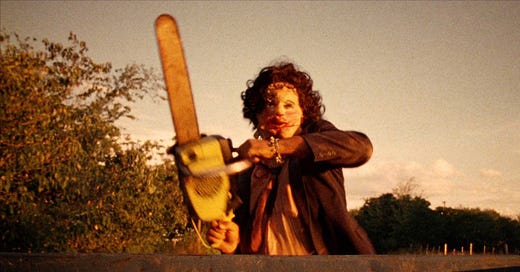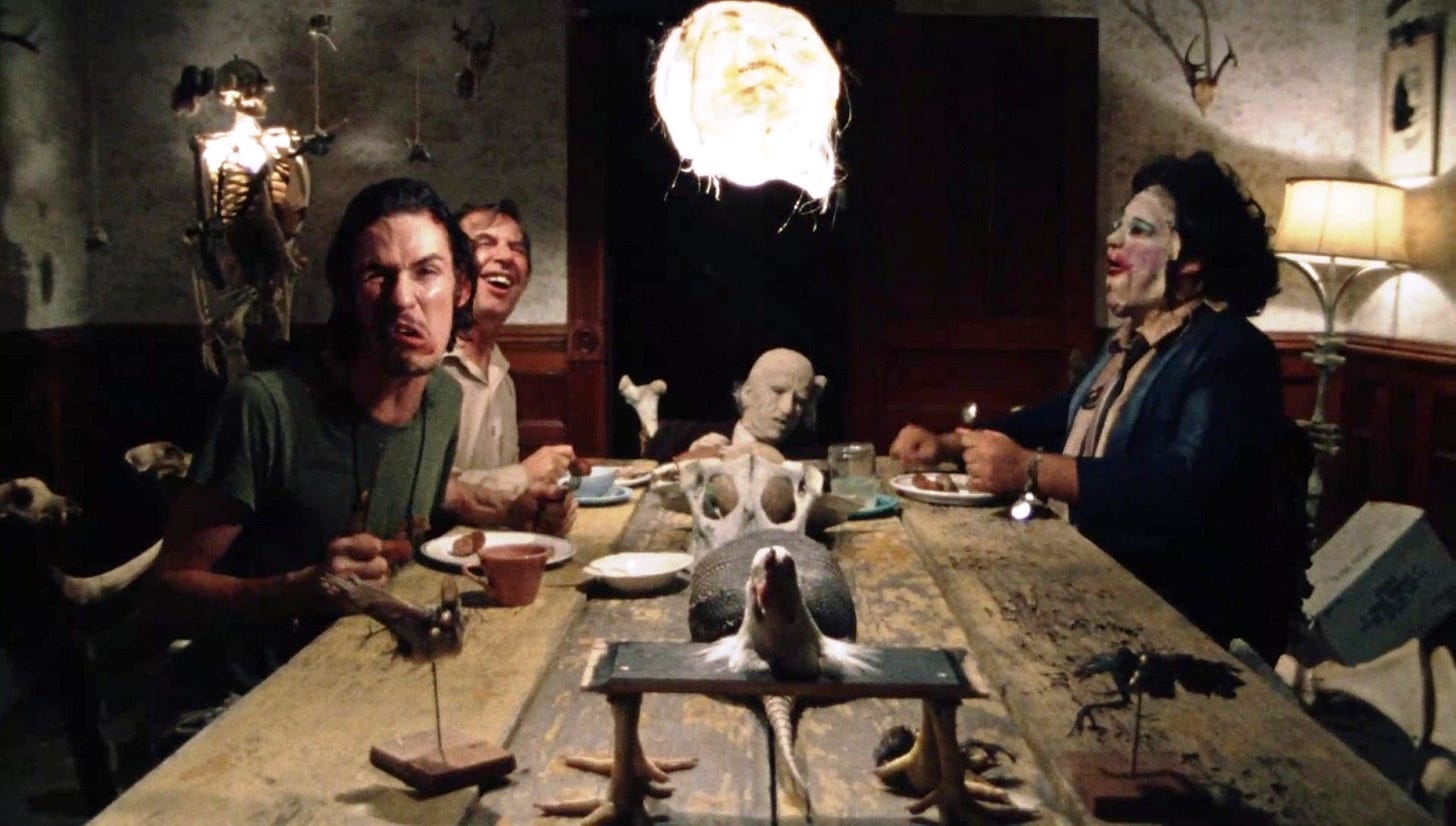Almost every time I do a reading, someone—sometimes the host, often an audience member—asks about writing sex: how exactly does one do it without being {TIGHT SHOT OF RAPID PUPIL CONTRACTION} cringe?1
Because of what I write about and what I am (namely, trans), even my non-sex writing is identified with sex and sexuality, so admittedly the interests of my audience skew along those lines. But it does seem that the fear of writing sex badly is a common one—from 1993 through 2022, the Literary Review had an annual award for it2—especially for writers who are young and unpublished. I’ve doled out my fair share of practical advice, but always with reservations I could never quite put into words. It’s not that I worried about being wrong; I’m no expert, but there are so many ways to approach this challenge, one shaped by endless anxieties and constraints, that I wonder if this is even possible.
Maybe that is what’s been bothering me. Why are so many writers afraid of writing sex in the first place?
A quick search turns up a survey of writers and filmmakers with recommendations for writing sex the non-humiliating way, most of it as sound (probably) as it is contradictory. The following, mostly sourced from interviews and essays, are just a small sample of how-tos, courses, and internet listicles that go on for pages:
Ask yourself, does it drive the plot?
Try storyboarding (just don’t forget your intimacy coordinator).
Listen, there’s nothing wrong with improving your craft. But don’t the stakes seem a little high for this particular facet of it? This fear of writing sex that’s too cheesy, tawdry, corny, or horny is so oppressive that people will fret and fuss and even fork over their hard-earned cash to get it right. How much sense does this make in 2025? Does writing sex well matter when everyone is beautiful and no one is horny and audiences (especially younger ones) want to see less sex3? Does it pay to master sex for a literary audience when “novelist” is less of a job than ever; when not even white male writers can get a word in edgewise; when such work that you do manage to publish is plagiarized by AI, the same technology that’s toasting the planet and stealing your day job; when the institutions that fund and recognize writers are in bed with genocidaires; when your best bet for making money is engagement, not expertise? From a career perspective, anyway, shouldn’t becoming “good” at writing sex rank pretty low on the writer’s hierarchy of needs?
“I don’t think of sex as any more difficult to write about than any other human behavior.” That’s Rachel Kushner, and I agree with her—to a point. Were our culture sex neutral, writing sex wouldn’t be any more difficult than writing about two people playing a game of chess. But if we’re afraid of talking about it honestly, let alone doing it, it follows that writing it can be just as fearful a prospect, if not more so. Because in this context, writing “bad” sex isn’t just a technical shortcoming. To fuck up a depiction of an act that we fetishize, at turns, as immoral yet sacred, unspeakable yet inescapable, unique yet uniform, as decadent and dirty and immoral, becomes a personal failing. We’re overidentified with and implicated by sex to the point that it can never be fictional, even in fiction. Any art worth its salt exposes the artist, but if this exposure doesn’t land, it’s an indictment of the most personal sort: if you’re unable to represent sex, this most common and animal and degraded of activities, one that everyone wants and does in the same and right way (or else!), not only have you demonstrated some level of inhumanity, but you’ve revealed yourself as a person to be too cheesy, tawdry, corny, or horny—that is, too literal, too earnest, or even on the wrong side of obscene4.
Unlike a game of chess, sex adjoins obscenity so closely that writing it poses emotional and even professional risks to the author that the former doesn’t. Perhaps on some level it serves us to confuse these risks with technical difficulty. We’d rather believe that there’s a method, a class, or a hack for sex writing than admit that doing it publicly makes us vulnerable to others and to ourselves.
You know what’s interesting? People ask me about writing sex in fiction even though it’s something I’ve done very little of. My characters have sexual fantasies, engage in sadomasochism, experience sexual assault, and dissociate their way out of and around consensual intercourse—but sex qua sex, and the activities it conventionally entails, rarely make it into one of my books. Even my sex writing here on DAVID is pretty oblique. I have a strong sense of privacy, though not about the things that most people are private about. Although it may not seem like it, there’s a lot that you will never see.
I haven’t written a lot of sex, but I have identified myself with it publicly and repeatedly, not just as a writer interested in sexuality, but as an out transsexual. I think this is what people who want my advice about writing sex are picking up on: that I’m living the worst-case scenario of a writer who is fearful of sexual exposure. This is something I’m proud of because I’ve sacrificed for it, this honesty, which has affected my relationship with my natal family, my career, and my safety in the world. I’m not fearless—far from it—and I won’t escape without, at the very least, the public humiliation of taking artistic risks only to strike out, which has happened too many times to count. But I am doing what many of these people are afraid is impossible for them, and that’s what they’re curious about, even if they don’t quite realize it.
Unfortunately, when it comes to writing sex, the only advice I have to offer is the worst kind someone can give: you just have to do it.
New fundraising request: Get a free month of subscriber-only DAVID content when you screenshot your donation to any amount to political prisoner Marius Mason, who is currently serving 22 years in federal prison for acts of property damage carried out in defense of the planet. A trans man, Mason won the right to be transferred to a men’s prison but was recently returned to a women’s facility following a Trump executive order.
Thank you for reading and sharing my weekly newsletter. You can also support me by buying my book. Find me on Twitter and Instagram.
I’m not a big deal, so such events are few and far between. With my new book coming out later this year, however, more are definitely in the works 💃
Notable winners include Normal Mailer and Morrissey, with John Updike meriting one for Lifetime Achievement.
The erotic thriller has been eulogized almost to death, but Karina Longworth’s podcast series on the subject is great stuff.
But isn’t this all of us? I recently started Carol J. Clover’s Men, Women, and Chainsaws: Gender in the Modern Horror Film, which explores the relationship of the young male viewer to the female victim-heroes of the slashers of the 1970s, 80s, and 90s. In her psychoanalytic reading, a horror film, like a dream, can be peopled with simultaneous variations of ourselves. “Competing figures…resonate with competing parts of the viewer’s psyche (masochistic victim and sadistic monster, for example)…the force of the experience, in horror, comes from ‘knowing’ both sides of the story.” As viewers confronted with fears “imaginable…only in nightmare” and fantasies we can’t admit to, even to ourselves, we manage our myriad repressions by identifying with characters across genders and “types,” an experience of forced de/feminization (though she doesn’t use this term) by the director. As Clover writes, “Hitchcock’s ‘torture the women’ then means, simply, torture the audience.”







stigmata
re footnote 2, chicago would be lucky to have you!